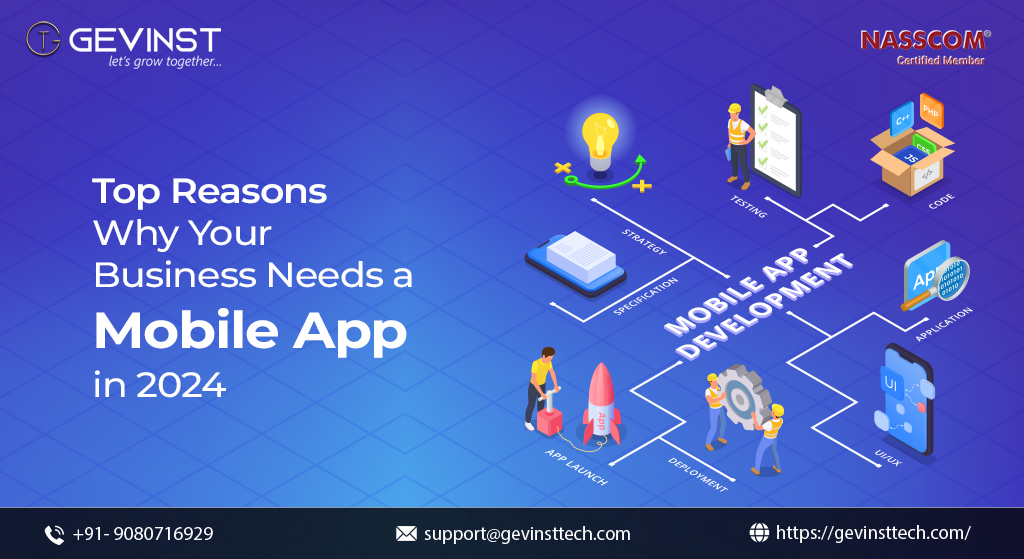
In today’s digitally driven world, when smartphones are essentially an extension of ourselves, having a mobile app for your company is no longer a luxury but a requirement. It’s an effective instrument that can open up a world of advantages, advancing your company and providing you with a competitive advantage.
An in-depth discussion of the advantages of app creation and the utility of apps for companies will be addressed in this blog, emphasising the need for mobile app development for businesses in 2024. We’ll also review common misunderstandings regarding developing mobile apps and why hiring an app development company is essential to ensuring a smooth process.
The Rise of Mobile: Why Are Apps Important?
The use of mobile phones is still soaring. There are more than 6.6 billion smartphone users worldwide, and this figure is expected to rise further. This translates to a sizable audience that you can interact with and directly reach with a well-thought-out mobile application.
However, why is mobile application development so crucial for companies? Let’s explore the compelling reasons why your business needs a mobile app in 2024:

1. Enhanced Customer Engagement
A mobile app offers a direct and quick way for you to communicate with your customers. With only a few clicks, they can order your goods or services, set up appointments, get information about them, and even get tailored recommendations. Stronger consumer relationships and brand loyalty are fostered by this ongoing engagement.
2. Increased Brand Visibility and Recognition
Being present in app stores greatly increases the awareness and recall of your brand. Users’ phones serve as a continual reminder for your app, which helps them remember you and makes it more likely that they will choose you over rivals.
3. Improved Customer Experience
A well-designed mobile app improves the user experience by giving a simple and easy way for customers to communicate with your company. Increased customer satisfaction and loyalty result from the simplicity with which customers can find what they’re looking for, make purchases, get support, and manage their accounts.
4. Powerful Marketing and Sales Tool
Mobile apps provide an effective platform for sales promotions and focused marketing initiatives. Push alerts, tailored offers, and in-app advertising are useful tools for efficiently reaching and converting your target audience.
5. Valuable Customer Insights and Data
Mobile apps produce useful data about the preferences, past purchases, and activity of users. Deeper consumer insights, customized marketing efforts, enhanced product offers, and data-driven decision-making for future expansion may all be achieved with the use of this data.
6. Competitive Advantage
In the very competitive business world of today, having a mobile app might be a big advantage for your company. It distinguishes you from rivals who don’t have a mobile presence by showcasing your dedication to innovation and customer-centricity.
7. 24/7 Accessibility and Convenience
Your mobile app acts as a digital shop or customer support centre that your clients can access from anywhere at any time. They may communicate with your company on their terms thanks to this convenience, which could enhance engagement and possibly lead to purchases.
8. Streamlined Operations and Efficiency
Numerous commercial operations, like order fulfilment and appointment scheduling, can be automated with mobile apps. This could result in lower expenses, more production, and enhanced operational efficiency for your company.
9. Building Brand Loyalty and Advocacy
Mobile apps that offer loyalty programs, unique content, and early access to new products can help to develop a sense of community and loyalty. This may inspire clients to act as brand ambassadors, telling their network about your company.
10. Adaptability and Future-Proofing
You can future-proof your firm and remain flexible with the help of mobile apps. They offer a platform to make use of cutting-edge innovations like virtual reality (VR) and augmented reality (AR) to improve user experience and stay ahead of the curve.

Myth vs. Reality: Exploring Common Misconceptions about Mobile App Development
Businesses have to deal with the realities of developing mobile apps as they realize the growing significance of mobile engagement. Nonetheless, a plethora of false beliefs frequently impairs judgment. Now, let’s explore the realm of developing mobile applications, dispelling popular misconceptions and emphasizing the real advantages and factors to take into account for companies.
Myth #1: Mobile App Development is Expensive and Time-Consuming
Reality: Even while sophisticated apps with lots of features can be expensive, there are options available in the development landscape to suit different budgets and schedules. These days, there are many different options available for app development services, ranging from custom creation with skilled professionals to affordable app builders with pre-built templates. Agile approaches, which divide projects into manageable sprints and enable quicker development cycles and cost control, are also used by app development companies.
Myth #2: My Business Doesn't Need a Mobile App - Websites Suffice
Reality: While websites serve a vital purpose, they cannot compete with the advantages of mobile apps. Apps offer unique advantages like:
- Reduced Risk
By focusing on a core set of features, you minimize the initial investment, reducing the financial risk associated with building a full-fledged product that may not succeed.
- Push Notifications
Directly engage users with timely updates and promotions.
- Offline Functionality
Provide value even without an internet connection (e.g., downloaded maps, saved content).
- Location-Based Services
Deliver personalized experiences based on user location (e.g., targeted promotions, store locators).
- Enhanced User Experience
Leverage mobile device features like cameras, GPS, and gyroscopes for richer interactions.
In today’s mobile-first world, apps for your business are no longer a luxury, but a necessity to stay competitive and provide an exceptional user experience.

Myth #3: Anyone Can Build a Mobile App - Technical Expertise is Unnecessary
Reality: While app builder platforms offer a low-code/no-code approach, building a successful app requires more than just dragging and dropping features. A well-designed app needs:
- User Interface (UI) and User Experience (UX) Design:
Creating an intuitive and visually appealing interface that fosters user engagement.
- Backend Development
Building the logic and infrastructure that powers the app’s functionality.
- API Integration
Connecting the app with external services and data sources.
- Testing and Quality Assurance
Ensuring the app functions flawlessly across different devices and operating systems.
While app builders can be a starting point, mobile application development often necessitates the expertise of developers, designers, and project managers to create a robust and successful app.
Myth #4: Building an App is a One-Time Project
Reality: Mobile application development is an ongoing process. A successful app requires
- Regular Updates
Keeping the app compatible with evolving operating systems and device specifications.
- Bug Fixes
Addressing any issues that arise to maintain a smooth user experience.
- New Feature Development
Continuously adding features and functionalities to keep users engaged and competitive in the market.
Therefore, consider app development companies that offer ongoing maintenance and support services to ensure your app remains relevant and successful in the long run.
Finding the Right App Development Partner

Conclusion
Investing in a mobile app can be transformational for organizations. Understanding the reality and benefits of mobile app development, as well as dispelling common fallacies, allows businesses to make informed decisions regarding this vital tool for reaching new customers, increasing brand awareness, and attaining sustainable growth in today’s mobile-centric environment.






